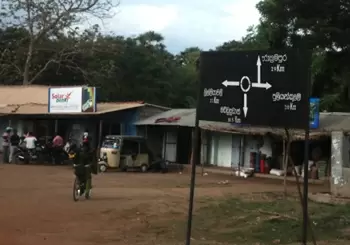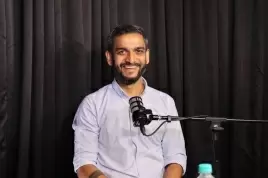US keeps Sri Lankan rights issue alive
21-December-2011
Vol 2 | Issue 50
The US State Department spokesperson Victoria Nuland’s statement that the report of the Sri Lankan government’s Lessons Learnt and Reconciliation Commission (LLRC) “does not fully address all the allegations of serious human rights violations that occurred in the final phase of the conflict” is a clear message that the Damocles Sword of ‘international action’ continues to hang over the head of President Mahinda Rajapaksa.
 |
|
Sinhalisation: A Sinhala-only signboard at an important junction in Puthukudyiruppu
|
If the US had a soft corner for Rajapaksa it could have given him a clean chit based on the LLRC report. Instead, it has asked a pertinent question, which incidentally is the central theme of the campaign by the Diaspora Tamils against the Sri Lankan government – ‘human rights violations in the final phase of the conflict.’
The LLRC report made public last Friday, concurs with the line of President Rajapaksa and his brother Gotabhaya Rajapaksa, defence secretary, that the war that decapitated the Liberation Tigers of Tamil Eelam was a humanitarian operation.
The commission says: “In evaluating the Sri Lankan experience, in the context of allegations of violations of international humanitarian law, it is satisfied that the military strategy adopted to secure the LTTE-held areas was one that was carefully conceived, in which the protection of civilian population was given the highest priority.”
The commission failed to examine the use of heavy artillery against civilian areas. After insisting for more than two years that not a single civilian had been killed by military strikes during the war, the government admitted for the first time in August to civilian deaths.
The commission, however, said it found no evidence of deliberate killings of civilians in “no fire zones” set up in the closing stages of the war. On consideration of all facts and circumstances before it, the commission said the security forces had not deliberately targeted civilians in the NFZs, although civilian casualties had in fact occurred in the course of crossfire.
Human rights groups have long accused both the government and the LTTE of abuses but the LLRC justifies the action of government forces. Its report says that account must be taken of the fact that military operations had to be conducted against an enemy who had no qualms about resorting to a combat strategy which paid little heed to the safety of the civilian population.
The LLRC report does not examine allegations that government forces executed leaders who came forward to surrender holding aloft white flags during the last days of the war.
It rubbishes the Channel 4 documentary which shows government soldiers executing handcuffed and blindfolded prisoners though the government had admitted that forces killed a young woman visible in the footage.
Sexual violence is not discussed in the report. The LLRC findings stand in stark contrast to those by the UN panel of experts which recommended the establishment of an independent international mechanism to investigate war crimes on both sides.
UN bodies and the international community have held back for the past 18 months to allow the Sri Lankan commission to make progress on accountability.
Several governments, including the US and the UK, have said they will support the establishment of an international investigation commission unless Sri Lanka demonstrates progress on accountability for war crimes.
But if the real purpose of setting up the LLRC was to justify President Rajapaksa’s conduct of the war, the commission has fulfilled its task.
Since it is clear that justice for conflict-related abuses is not going to happen within Sri Lanka’s domestic institutions, the time has come for the UN Secretary-General to set up an independent, international inquiry commission. - TWL Bureau
















